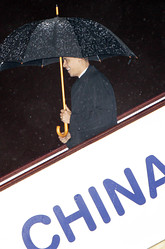The New York Times on meetings between Presidents Obama and Hu in Beijing yesterday:
Some analysts said the news conference at noon was notable more for spelling out the points on which the two nations disagreed than for presenting any substantial agreements reached.
Also noteworthy was the range of issues on which the United States was asking China’s help, something that might have been unthinkable before the United States became embroiled in the wars in Iraq and Afghanistan and before its economy was hobbled by the global financial crisis that began on its shores. China, meanwhile, has so far weathered the financial crisis in relatively good form.
“Before the financial crisis, the U.S. was in a world leader position,” said Shi Yinhong, a professor of international relations at the People’s University of China in Beijing. “Now, with China and the United States, maybe we see that the U.S. depends on the China for more issues than China depends on the U.S.”
Neither of the presidents took questions from reporters, staying in line with the minutely stage-managed atmosphere of Mr. Obama’s first visit to China, which began on Sunday. They said in separate speeches that the two nations would work together to stabilize the teetering world economy, contain the dangers of climate change and prevent nuclear proliferation. Later, the White House released a joint statement from the two leaders stressing those points and giving a few more details regarding each.
Read the Joint Statement here, as well as U.S.-China Clean Energy Announcements and U.S.-China Joint Statement, also released by the White House.
And from the Christian Science Monitor:
Asian diplomats often say that just showing up is a large part of successful diplomacy. If so, President Obama has given US interests a strong boost with his eight-day trip across Asia, despite the “deliverables” – like a pledge from China to set specific limits on carbon emissions – that are missing from meetings with the region’s leaders. Bringing his rhetorical skills and personal popularity to bear on the many issues that Washington faces on the Pacific’s western rim, he has reassured allies and laid to rest some accumulated grievances.
Yet even Mr. Obama’s charms have not resolved the conundrum that precipitates unease across Asia and the rest of the world: a resurgent China with an aversion to international leadership.
From climate change to sustainable global prosperity to regional security, China is the essential player, and courting its cooperation is the challenge. China may resist sharing the burden of global leadership, but economic interdependence still gives Washington and Beijing a shared destiny. As he heads home, Obama must consider how to transform that mutual dependence into a working partnership that promotes peace and prosperity for the entire Asian region.
See also, “Obama and China: Cooperation, but also differences” from USA Today and the following video report from AP:
Meanwhile, the Wall Street Journal blog reports that Obama is making a big impact for one of the simplest actions he took while in China: carrying his own umbrella:
(Photo by AP) “I felt unaccustomed to this — Obama holding the umbrella on his own,” said a commentator on the Web site of the Wuhan-based Changjiang Daily. “There was nobody crowding round. The Chinese public puts up with a culture in which government officials have their umbrellas held for them. Officials enjoying themselves under an umbrella don’t even think they are doing anything wrong.”
“Why don’t we learn from the spirit of umbrella-holding by Obama?” asked a blogger called Nanshan Fangma. “The United States is not a heaven, nor is it a hell. At least there are some examples we can learn from at this stage”.
The USC U.S.-China Institute has posted a primer on issues and positions in U.S.-China relations that Obama and Hu are discussing during the visit.
The New York Times also reports on Obama’s position on human rights in China and other politically sensitive issues.
For opinions on Obama’s trip so far, see:
– “Welcome, China?“, an editorial from the Washington Post
– “Obama on the back foot in China” by Jonathan Fenby in The Guardian
– “The Great Wallop” by Niall Ferguson and Moritz Schularick in the New York Times
– “Slouching Toward Weakness” from the National Review
– “Does America Have a China Policy?” by Will Marshall of the Progressive Policy Institute, on the Huffington Post
– “Chinese Media Perspectives on Obama’s Visit” from New American Media








